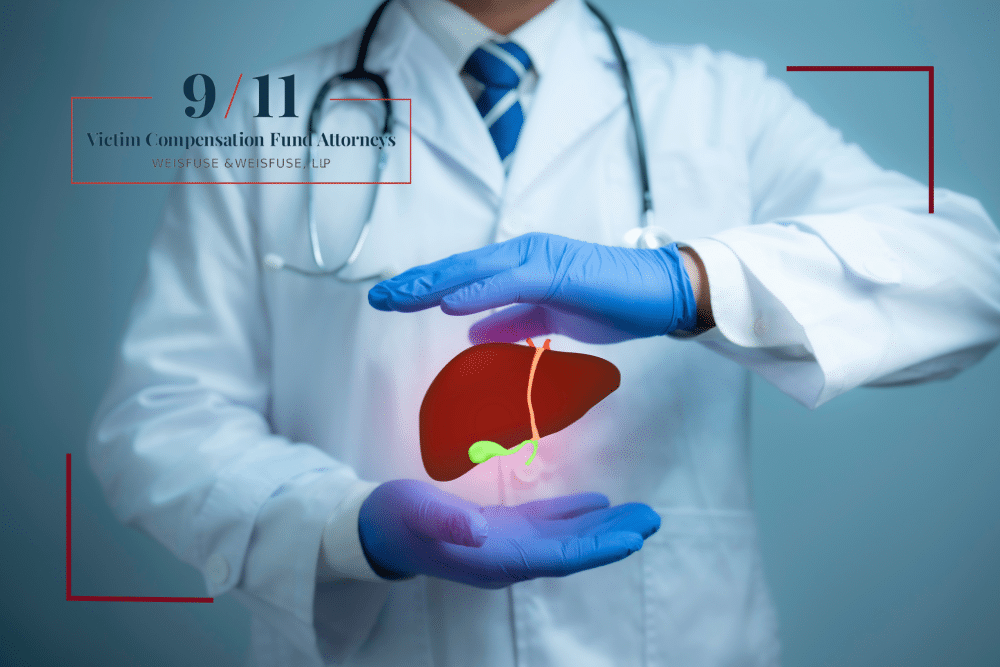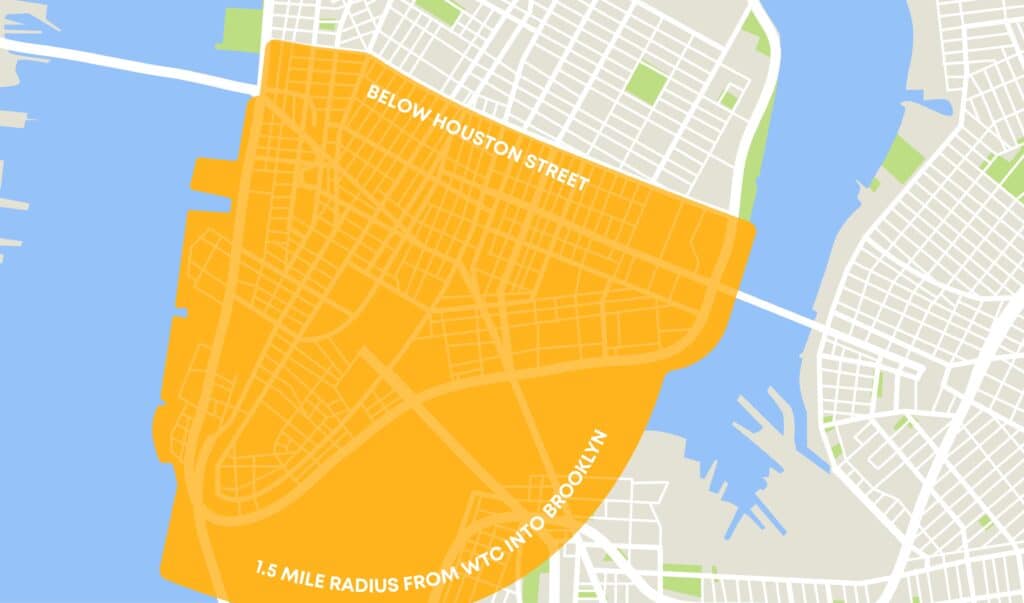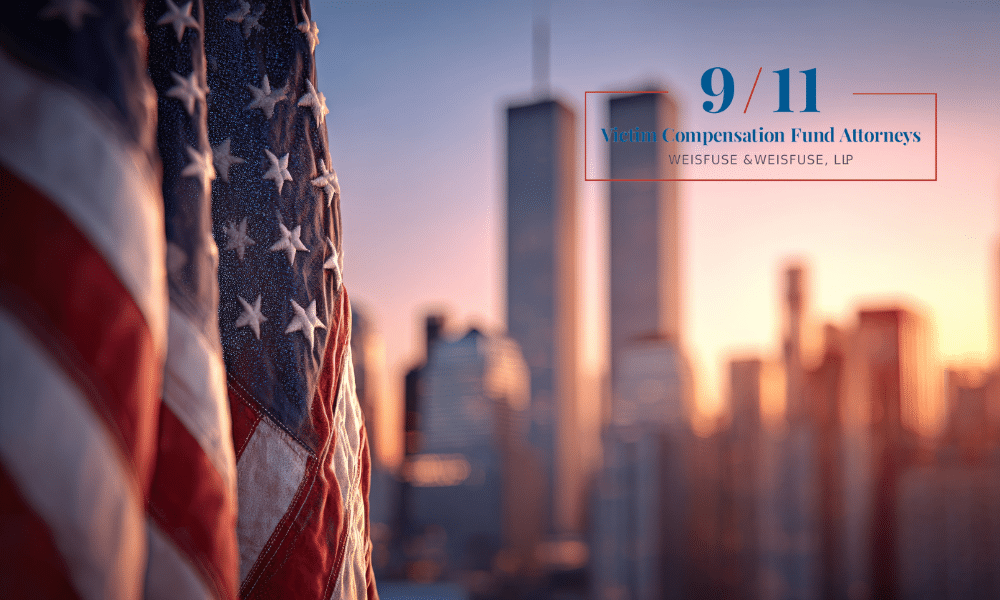
9/11 Bladder Cancer Compensation Claim
Exposure to the toxic 9/11 dust cloud is associated with more than 70 cancers, of which liver cancer is one. If not treated in its early stages, liver cancer can spread and be deadly.
9/11 responders and downtown NYC residents, workers, and students have an elevated risk of liver cancer compared to the general population.
Liver cancer and 9/11 payouts
Any responder or other individual who was exposed to the NYC dust cloud during the months after the 9/11 attacks and who develops cancer is eligible to receive free lifetime healthcare from the World Trade Center Health Program (WTCHP). Considerable compensation via the September 11th Victim Compensation Fund (VCF) may also be available.
Understanding more about the disease and the programs available can help survivors and responders take the necessary steps to monitor, diagnose, and treat any issues, and claim their rightful compensation.
What is liver cancer?
Liver cancer, like many cancers, can severely impact a victim’s life and the lives of their families, especially if it is not diagnosed and treated early.
The liver is responsible for multiple key bodily functions. It is a vital organ that filters the blood and removes toxins/waste products, as well as aiding digestion, processing nutrients, and storing vitamins and minerals.
A tumor that starts in the liver poses a great health risk. Liver cancer, however, takes different forms, and outcomes depend greatly on the type of cancer that affects the patient and how early the condition is diagnosed.
9/11 responders and survivors typically suffer from one of the following four types of liver cancer:
- Hepatocellular cancer: The most common liver cancer type, beginning as an isolated tumor and potentially spreading to other parts of the liver, which increases the likelihood of a second liver cancer type developing (the longer the disease progresses, the greater the risk).
- Intrahepatic cholangiocarcinoma: Responsible for one in five to one in ten of all liver cancers diagnosed among 9/11 victims, beginning in the cells that line the bile ducts.
- Angiosarcoma and hemangiosarcoma: A rarer and more deadly type of tumor, beginning in the cells that line the blood vessels in the liver and growing rapidly.
- Secondary liver cancer: Cancer that has spread from elsewhere in the body, such as the intestines, which is quite common.
Liver cancer has generally poor outcomes in the U.S., with a five-year relative survival rate of just over 20 percent for all types. When the cancer is confined to the liver, the rate is higher—roughly 37 percent—but once the cancer has spread to distant organs (metastatic disease), the five-year survival rate drops to a mere 3-4 percent.
Because early-stage liver cancers often cause few or no symptoms, many cases are diagnosed late. Late diagnosis tends to limit treatment options and lowers the chance of long-term survival.
Early detection can increase the chances of beating liver cancer, especially for those with an elevated risk of the disease, like 9/11 survivors and responders. Registration with the WTC Health program is essential—even in the absence of symptoms.
By registering with the program, survivors and responders can receive the required monitoring, screening, and early treatment if symptoms of cancer or another WTC-related condition develop.
9/11 toxic dust exposure and liver cancer
Survivors and responders face an elevated risk of liver disease because of the harmful, toxic dust and fumes present in the cloud that hung over Lower Manhattan for months after the attacks.
Liver toxicity has been relatively common in survivors and responders. Research has consistently proven that individuals exposed to the types of toxins that responders and survivors inhaled after 9/11 have an elevated risk of developing liver cancer, hepatic steatosis, toxicant-associated fatty liver disease, and cirrhosis of the liver.
WTC Health Program treatment options for liver cancer
9/11 survivors and responders face a unique array of health challenges, including multiple cancers and aerodigestive disorders. Monitoring, screening, and treatment of these conditions is essential to prevent worsening of the conditions and increasing disruption to victims’ lives.
WTC Health Program Clinical Centers of Excellence are spread throughout the New York region to provide such care, while the Nationwide Provider Network also provides clinical care for members outside the area.
Treatment options for liver cancer depend on the type and stage of the cancer. Chemotherapy, radiotherapy or other therapies such as chemoembolization may be available to patients, while surgery or even a liver transplant may also be possible.
Qualifying for 9/11 liver cancer compensation
9/11 liver cancer compensation is available to any individual present in lower Manhattan between 9/11 and May 30, 2002, diagnosed with the condition, and certified by the WTC Health Program. Victims present at the Pentagon site or the Shanksville, PA, site can also claim compensation.
However, registration deadlines apply and victims must prove their presence in the exposure zone between the eligible dates to receive compensation. The assistance of a 9/11 compensation lawyer is often required, helping to file the claim with supporting evidence and handling the legal steps while victims can focus on treatment or recovery from their conditions.
VCF cancer payouts for 9/11 liver cancer
Liver cancer compensation can amount to $250,000-plus (tax-free) from the VCF. Victims can be compensated for both economic and non-economic losses suffered as a result of the condition.
Economic losses cover past medical expenses, loss of income and benefits, and other out-of-pocket expenses related to the health condition. Non-economic compensation covers the pain and suffering associated with the condition, and its impact on daily life.
The families of victims who have passed away from liver cancer are also entitled to receive compensation from the VCF. The spouse and dependents may be eligible to receive $100,000 each, while $250,000 may be available for the decedent’s estate.
To discuss your situation and learn more about how we may be able to help you, please call Weisfuse & Weisfuse, LLC at 212-983-3000 or contact us online to schedule a free consultation.







